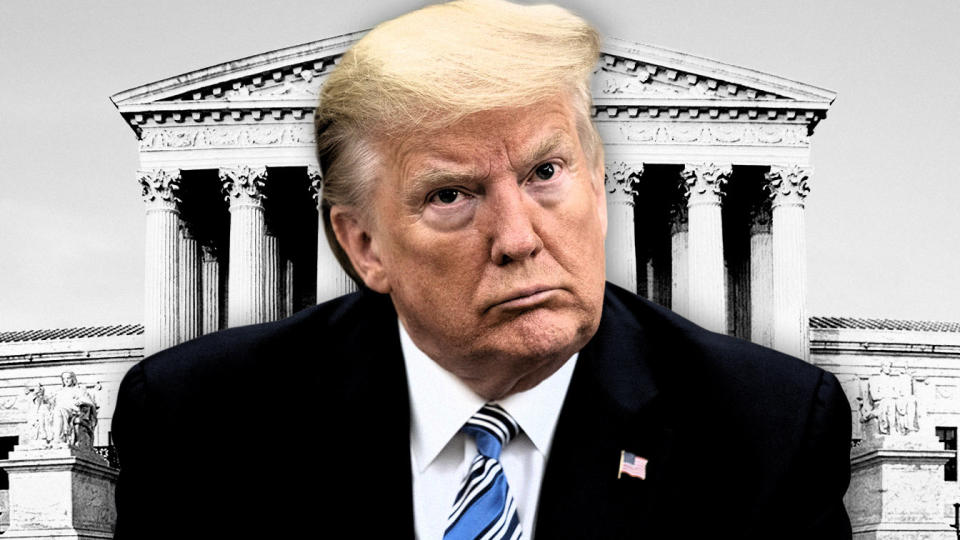SCOTUS rulings on Trump taxes and financial records: Explained
- Oops!Something went wrong.Please try again later.
The Supreme Court on Thursday issued rulings in two cases related to President Trump’s finances, the first time the court has ruled in cases involving his personal affairs. In one, it denied his claim for absolute immunity from criminal investigation, upholding a New York district attorney's demand for his tax returns, but in the other, it deferred enforcement of a congressional subpoena for financial records that House committees have been seeking for more than a year. Trump has long fought to keep his tax returns and personal finances private.
The cases
In the first case, Trump v. Vance, the president had sought to block Manhattan District Attorney Cyrus Vance from obtaining his tax returns in an ongoing grand jury investigation that involves, among other things, hush money Trump allegedly paid to porn star Stormy Daniels and another woman during the 2016 presidential campaign.
In the second, Trump v. Mazars USA et al., the president sought to quash subpoenas that were issued in April 2019 by the House Financial Services, Intelligence and Government Oversight committees to Deutsche Bank, Capital One and Mazars — the banks and accounting firm used by the Trump family’s real estate business.
The rulings
In the first case, Trump v. Vance, a 7-2 majority of the court, with Justices Samuel Alito and Clarence Thomas in dissent, rejected arguments by Trump’s lawyers and the Justice Department that the president is immune from investigation while he holds office.
The opinion was written by Chief Justice John Roberts and joined by Trump’s two appointees, Justices Neil Gorsuch and Brett Kavanaugh.
“Two hundred years ago, a great jurist of our Court established that no citizen, not even the President, is categorically above the common duty to produce evidence when called upon in a criminal proceeding,” Roberts wrote. “We reaffirm that principle today and hold that the president is neither absolutely immune from criminal subpoenas seeking his private papers nor entitled to a heightened standard of need.”
That strong statement by a solid majority of the court was considered by legal observers a victory for the rule of law. But the case was remanded back to a lower court, where Trump’s lawyers can raise other legal arguments, likely delaying the actual production of the records indefinitely. And because the grand jury process is confidential, the returns, which Trump has refused to release, may never be made public, unless Vance’s investigation results in an indictment and trial.
In another 7-2 ruling, also written by Roberts with the same lineup of justices, the court sent the Trump v. Mazars case back to the lower courts to address “special concerns regarding the separation of powers” in the fight between Congress and the executive branch.
The decision means that litigation over the congressional subpoenas will continue, and that the president’s financial documents will remain hidden for now.

The reactions
Shortly after the court’s decisions were unveiled, the president lashed out on Twitter.
“The Supreme Court sends case back to Lower Court, arguments to continue,” Trump tweeted. “This is all a political prosecution. I won the Mueller Witch Hunt, and others, and now I have to keep fighting in a politically corrupt New York. Not fair to this Presidency or Administration!”
“Courts in the past have given ‘broad deference,’” he added. “BUT NOT ME!”
Later, speaking to reporters at the White House, Trump called the rulings "a political witch hunt, the likes of which nobody has ever seen before.
“It's a pure witch hunt,” he said. “It's a hoax."
But Trump’s attorney Jay Sekulow said he was “pleased” with the rulings.
“We are pleased that in the decisions issued today, the Supreme Court has temporarily blocked both Congress and New York prosecutors from obtaining the president’s financial records,” Sekulow said in a statement. “We will now proceed to raise additional constitutional and legal issues in the lower courts.”
House Speaker Nancy Pelosi said the decision was “not good news for the president of the United States.”
“[The] chief justice specifically speaks to the fact that the president is not above the law, and that was something that was proclaimed in the decision, including [by] two of his recent appointments,” Pelosi said, adding: “The Congress will continue to conduct oversight for the people, upholding the separation of powers that is the genius of our Constitution. We will continue to press our case in the lower courts.”
What’s next
Because the cases were kicked back to the lower courts, they almost certainly will still be in litigation until after the election. It’s unclear what might happen if Vance’s office brings charges against Trump if he is reelected to a second term.
___
Read more from Yahoo News:


